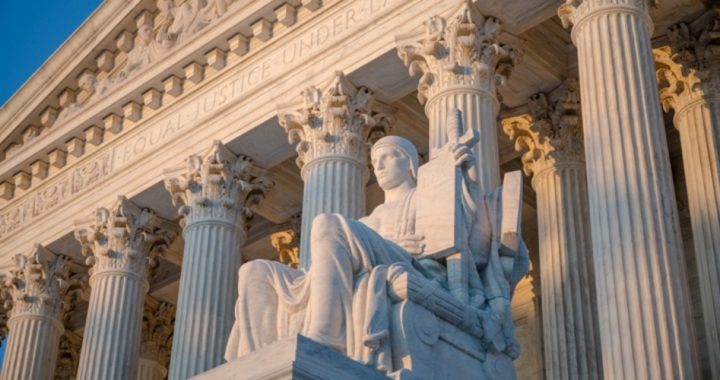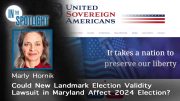
The U.S. Supreme Court has decided to hear two cases in which the central issue is whether a member of the so-called Electoral College can cast a vote for the candidate of his choice, rather than vote for the candidate who received the most popular votes in his state.
Regardless of how the Supreme Court decides, it seems inevitable that the Electoral College will be forced to function under new rules after the justices hand down their “ruling.”
The cases come from Washington State and Colorado, each of which challenges laws in those states that forbid electors from deviating from the people’s preference.
“We are thrilled the Supreme Court will take up our cases, and we look forward to our historic day in court. The states had no power to penalize us merely for exercising our right to vote,” Michael Baca, the plaintiff in the Colorado case, and Bret Chiafalo, one of the Washington State electors, wrote in a statement they released together.
“We are glad the Supreme Court has recognized the paramount importance of clearly determining the rules of the road for presidential electors for the upcoming election and all future elections,” added Lawrence Lessig, the Harvard Law School professor representing the electors. “My team and I will get right to work on our briefs, and we look forward to a full and fair hearing.”
Speaking of law school and the Constitution, I’m going to do something that is never done in constitutional law classes in law school: refer to the actual text of the Constitution!
Article II, Section 1 and the 12th Amendment of the U.S. Constitution set the following method for choosing the president of the United States:
The executive power shall be vested in a President of the United States of America. He shall hold his office during the term of four years, and, together with the Vice President, chosen for the same term, be elected, as follows:
Each state shall appoint, in such manner as the Legislature thereof may direct, a number of electors, equal to the whole number of Senators and Representatives to which the State may be entitled in the Congress: but no Senator or Representative, or person holding an office of trust or profit under the United States, shall be appointed an elector.
The electors shall meet in their respective states and vote by ballot for President and Vice-President, one of whom, at least, shall not be an inhabitant of the same state with themselves; they shall name in their ballots the person voted for as President, and in distinct ballots the person voted for as Vice-President, and they shall make distinct lists of all persons voted for as President, and of all persons voted for as Vice-President, and of the number of votes for each, which lists they shall sign and certify, and transmit sealed to the seat of the government of the United States, directed to the President of the Senate; — The President of the Senate shall, in the presence of the Senate and House of Representatives, open all the certificates and the votes shall then be counted; — the person having the greatest number of votes for President, shall be the President, if such number be a majority of the whole number of electors appointed; and if no person have such majority, then from the persons having the highest numbers not exceeding three on the list of those voted for as President, the House of Representatives shall choose immediately, by ballot, the President. But in choosing the President, the votes shall be taken by states, the representation from each state having one vote; a quorum for this purpose shall consist of a member or members from two-thirds of the states, and a majority of all the states shall be necessary to a choice.
During the debates at the Constitutional Convention of 1787, there were many proposals for choosing the president. The convention finally settled on a complex system that the delegates believed would result in the best men being elected as the chief executive.
Then, the deliberations of the ratification debates at the various state conventions there were fewer heated arguments over this provision in the Constitution than in many others.
With very few exceptions, the men serving at those conventions were students of history and they knew that democracies were doomed to chaos and violence. Therefore, the thought of having the people directly elect the president was dismissed by all but the most ardently democratic delegates.
The concept of filtering the effect of faction and corruption through layers of representation is central to the Constitution. Although it was altered by the 17th Amendment, U.S. senators were elected by the members of the state legislatures, for example.
In the present case, the principle is practiced by having the members of the state legislatures appoint electors and those electors elect the president. While not directly elected by the people, the people’s choice for president is manifest in their votes for state legislature. It should be presumed that a citizen would vote for a state legislator that would mirror his own choice for chief executive. It’s that simple.
Furthermore, the U.S. Constitution’s process of presidential election by what we call the Electoral College would be unnecessarily redundant if those electors were simply meant to vote as the people themselves would vote! Why not just cut out the middle man?
Because, for the Founders, the middle man — the electors — were meant to be men of eminent virtue and wisdom who could be relied upon to cast votes for men of equal mettle.
As evidence of the purpose behind the process, consider these statements on the subject taken from The Federalist, commonly called The Federalist Papers.
In The Federalist, No. 10, James Madison wrote that a republic is able to “refine and enlarge the public views, by passing them through the medium of a chosen body of citizens, whose wisdom may best discern the true interest of their country, and whose patriotism and love of justice, will be least likely to sacrifice it to temporary or partial considerations.”
But “democracies,” he added, “have ever been spectacles of turbulence and contention; have ever been found incompatible with personal security, or the rights of property; and have, in general, been as short in their lives as they have been violent in their deaths.”
In The Federalist, No. 68, Alexander Hamilton explained how the method chosen by him and his colleagues of electing the president was still influenced by the will of the people.
The Founders wanted the sense of the people to be reflected in the choice of the individuals — the electors — in whom so important a trust was to be confided.
Regarding the decision to rely on such a body to make such an important decision, Hamilton wrote:
It was equally desirable, that the immediate election should be made by men most capable of analyzing the qualities adapted to the station, and acting under circumstances favourable to deliberation, and to a judicious combination of all the reasons and inducements that were proper to govern their choice. A small number of persons, selected by their fellow citizens from the general mass, will be most likely to possess the information and discernment requisite to so complicated an investigation.
It was peculiarly desirable, to afford as little opportunity as possible to tumult and disorder. This evil was not least to be dreaded in the election of a magistrate, who was to have so important an agency in the administration of government. But the precautions which have been so happily concerted in the system under consideration, promise an effectual security against this mischief.
So, certainly the U.S. Supreme Court was never intended to be the rule maker for its sister branches of the general government. That said, we must be prepared to refer to the words of the men who wrote and ratified the U.S. Constitution to prove that they never intended the presidential electors to be superfluous, simple reflections of the people’s preference. They knew from their study of history that democratically electing the president would be unwise and ultimately unstable.
Accordingly, they designed a system that would be influenced by the opinion of the people without being controlled by it. Presidential electors would be chosen by people who were chosen by the people, but they would be men of unalloyed virtue and remarkable knowledge. They would need such substantial qualifications as they would be relied upon constitutionally to cast their votes for the candidate they deemed most worthy of wielding the substantial power of the presidency.
Photo: sharrocks/iStock/Getty Images Plus
Joe Wolverton II, J.D., is the author of the books The Real James Madison and What Degree of Madness: Federalist 46 and James Madison’s Call to Make America STATES Again.



